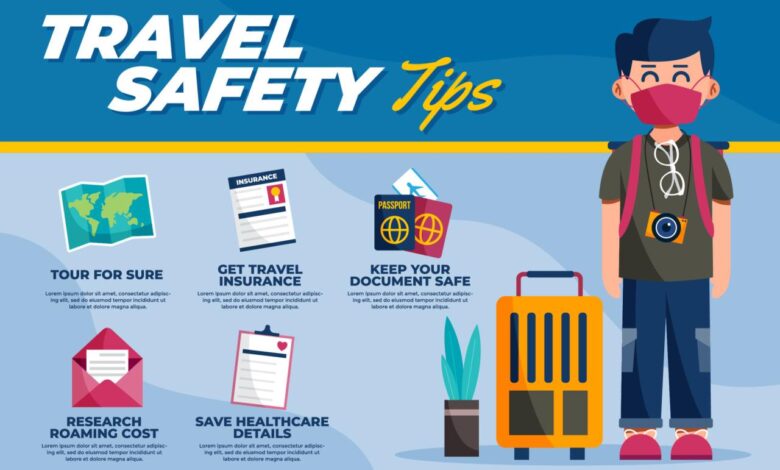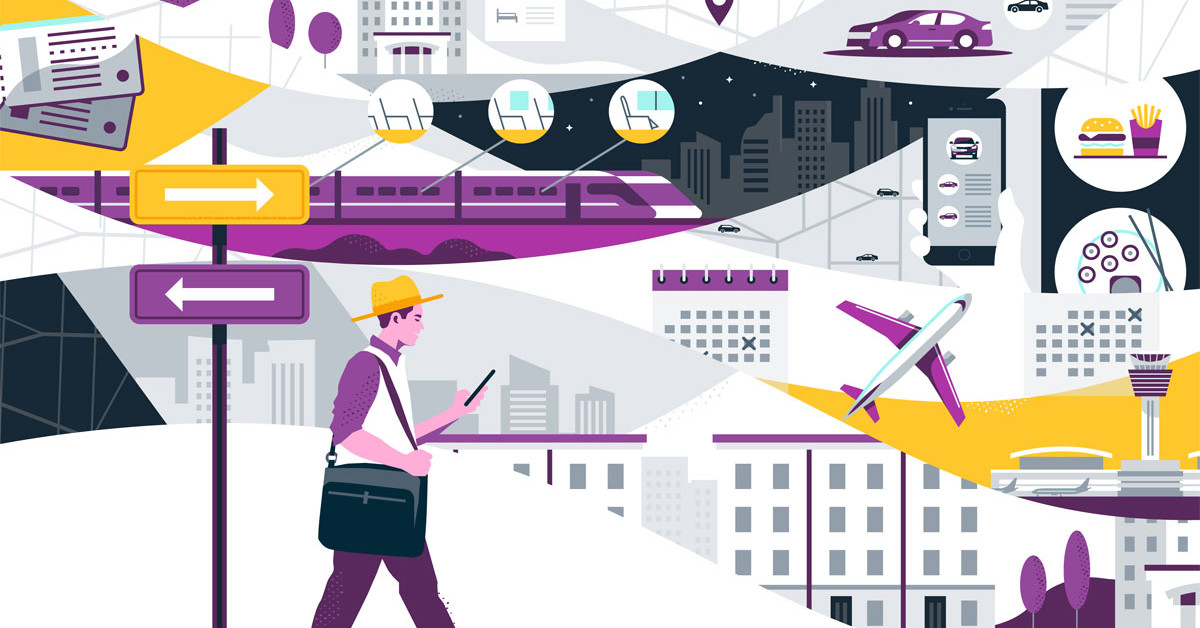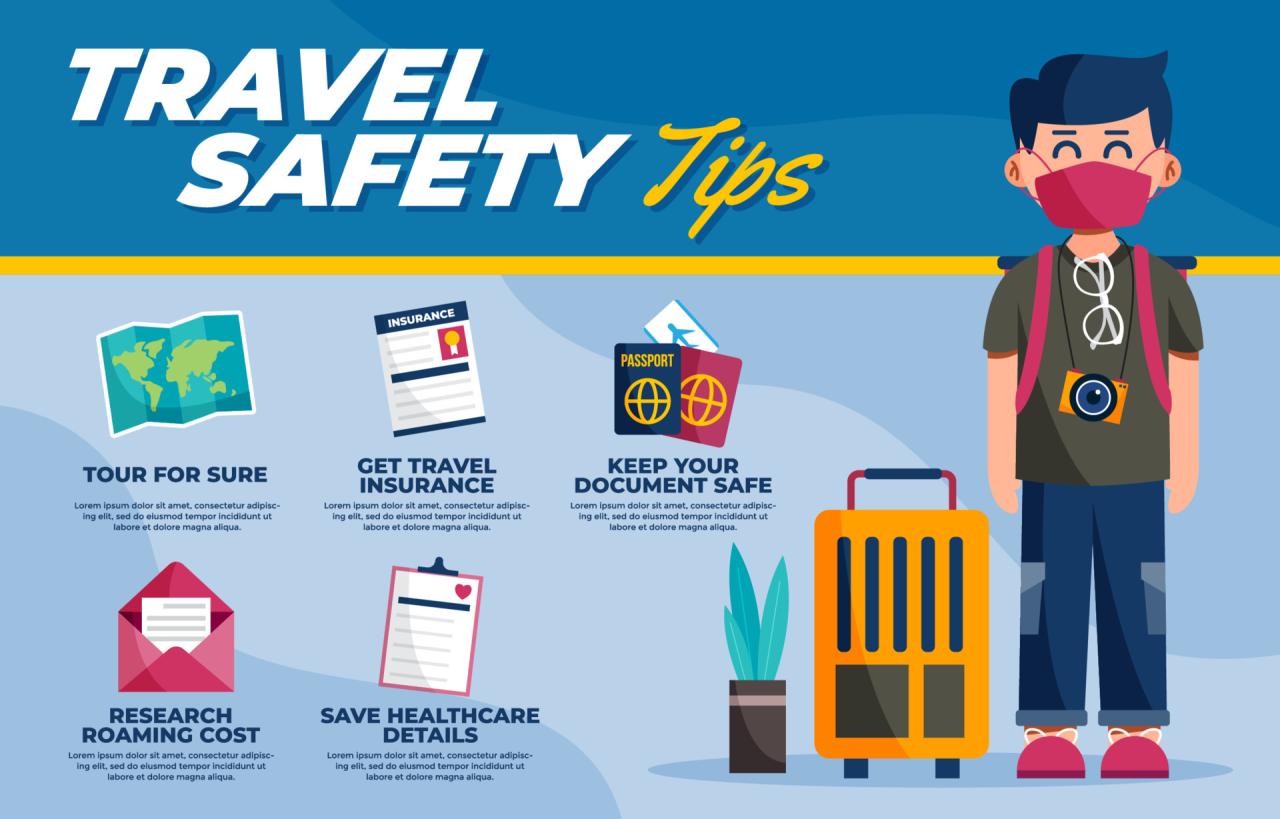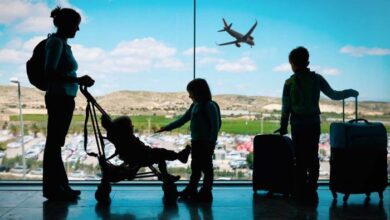
17 Business Travel Safety Tips: Stay Safe and Secure on the Road
17 Business Travel Safety Tips: Navigating the world of business travel can be exciting, but it’s also crucial to prioritize safety. From pre-trip planning to staying vigilant during your journey, there are many steps you can take to ensure a smooth and secure experience.
Whether you’re a seasoned traveler or just starting out, these tips will help you stay safe and enjoy your trip.
This comprehensive guide will delve into various aspects of travel safety, including pre-trip planning, travel security, transportation safety, health and well-being, financial security, cybersecurity, personal safety, and emergency preparedness. We’ll cover essential tips and strategies for navigating airports, public transportation, unfamiliar environments, and potential risks, ensuring you’re well-equipped to handle any situation that may arise.
Pre-Trip Planning

Pre-trip planning is crucial for a safe and successful business trip. It involves taking proactive steps to mitigate risks and ensure a smooth journey. By carefully considering factors like accommodation, documents, and destination-specific safety measures, you can significantly enhance your safety and well-being while traveling for work.
Choosing Safe Accommodations
Choosing safe accommodation is essential for a comfortable and secure stay. Consider factors like location, security features, and online reviews to make an informed decision.
- Location:Opt for accommodations in well-lit and populated areas with easy access to public transportation and emergency services. Avoid secluded or isolated locations, especially if traveling alone.
- Security Features:Look for accommodations with security measures such as keycard access, surveillance cameras, and on-site security personnel. These features provide an additional layer of protection against unauthorized entry and potential threats.
- Online Reviews:Read reviews from previous guests to gain insights into the accommodation’s safety and security measures. Pay attention to comments about the neighborhood, staff responsiveness, and any incidents reported by other travelers.
Packing Essential Documents and Items
Packing essential documents and items is vital for a safe and hassle-free trip. A comprehensive checklist can help you ensure you have everything you need for a secure and comfortable journey.
- Passport and Visa:Ensure your passport is valid for at least six months beyond your intended travel dates. Obtain any necessary visas or travel permits well in advance.
- Airline Tickets and Itinerary:Keep all travel documents, including airline tickets, hotel reservations, and itinerary, organized and readily accessible.
- Emergency Contact Information:Carry a list of emergency contacts, including family members, friends, and your company’s emergency hotline, in case of an unexpected situation.
- Travel Insurance:Obtain comprehensive travel insurance that covers medical expenses, lost luggage, and trip cancellations. It provides financial protection in case of unforeseen events.
- Photocopies of Important Documents:Make photocopies of your passport, visa, credit cards, and other important documents and keep them separate from the originals. This can help you recover lost or stolen documents.
Researching Destination-Specific Safety Risks and Precautions
Researching destination-specific safety risks and precautions is crucial for staying informed and taking appropriate measures to minimize potential dangers.
- Local Laws and Customs:Familiarize yourself with local laws and customs, including dress codes, social etiquette, and prohibited behaviors. Respecting local traditions can help you avoid unwanted attention or misunderstandings.
- Crime Rates and High-Risk Areas:Research the crime rates and high-risk areas in your destination. Avoid traveling alone or at night in unsafe neighborhoods, and be aware of your surroundings at all times.
- Health Risks and Vaccinations:Consult your doctor about necessary vaccinations and health precautions for your destination. Pack essential medications and a first-aid kit, and be aware of potential health risks, such as food poisoning or mosquito-borne diseases.
- Natural Disasters and Emergencies:Research the potential for natural disasters, such as earthquakes, floods, or hurricanes, in your destination. Be prepared with an emergency plan and know how to contact local authorities in case of an emergency.
Sharing Travel Plans and Keeping Contacts Updated
Sharing your travel plans with trusted contacts and keeping them updated is essential for safety and peace of mind.
- Inform Family and Friends:Share your itinerary, including flight details, accommodation information, and planned activities, with family members or close friends. This allows them to monitor your whereabouts and provide support if needed.
- Company Emergency Contact:Inform your company’s emergency contact about your travel plans and provide them with your itinerary and contact information. This ensures they can reach you in case of an emergency or if you need assistance.
- Regular Updates:Keep your contacts updated on your location and any changes to your itinerary. This allows them to track your progress and ensure your safety.
Travel Security
Staying safe while traveling is paramount. You’ll be exploring new places, encountering different cultures, and navigating unfamiliar environments. Implementing security measures for your belongings and yourself is crucial to a worry-free and enjoyable trip.
Securing Luggage and Personal Belongings
Protecting your luggage and belongings is essential. These items contain your valuables and personal effects. They also represent a significant investment. To ensure your belongings remain safe, follow these tips:
- Use a secure lock:Employ a TSA-approved lock on your luggage. This allows security personnel to inspect your bags without damaging the lock. It also deters theft.
- Carry valuables separately:Keep essential documents, jewelry, and expensive electronics in a secure, carry-on bag. This ensures you have access to these items throughout your journey.
- Pack discreetly:Avoid showcasing expensive items in your luggage. Pack valuables discreetly, and don’t leave them visible.
- Use luggage tags:Ensure your luggage is identifiable. Place a tag with your contact information on your bag.
- Consider a luggage tracker:Invest in a luggage tracker to monitor your bag’s location.
This can help you recover it if it gets lost or stolen.
Staying Vigilant in Public Spaces
Staying alert in airports, train stations, and public spaces is crucial. These locations attract crowds, making them potential targets for theft and scams.
From packing light to staying vigilant, those 17 business travel safety tips are crucial for a smooth trip. But just like outdated apps on your phone can be a security risk, it’s important to be aware of your surroundings and use reliable tools, like the latest navigation apps, to avoid getting lost.
That’s why I agree with the argument that Apple needs to evict old and unsupported apps from the App Store, as outlined in this blog post , to ensure a safer and more efficient user experience. After all, staying safe on the road is just as important as having a secure digital environment, and both require us to be proactive and adapt to changing circumstances.
- Be aware of your surroundings:Pay attention to your surroundings and notice any suspicious activity. This can help you identify potential threats and avoid becoming a victim.
- Keep valuables close:Securely hold your wallet, phone, and other valuables close to your body. Avoid leaving them unattended in public spaces.
- Avoid displaying large amounts of cash:Don’t flaunt large sums of money. This could make you a target for thieves.
- Be cautious of distractions:Be wary of distractions like someone bumping into you or asking for directions. These can be tactics used by thieves to distract you while they steal your belongings.
- Trust your instincts:If something feels wrong, it probably is. Trust your gut and move away from the situation.
Avoiding Scams and Fraudulent Activities
Scams and fraudulent activities are common in tourist areas. Be aware of common scams and protect yourself from becoming a victim.
- Be wary of unsolicited offers:Avoid accepting unsolicited offers for tours, souvenirs, or other services, especially if they seem too good to be true.
- Don’t give out personal information:Be cautious about sharing personal information like your passport number, credit card details, or home address with strangers.
- Verify information:Before making any purchases or bookings, verify the information with a reliable source.
Check reviews and ratings online.
- Be aware of currency exchange scams:Be cautious of currency exchange booths that offer unrealistic exchange rates.
- Report suspicious activity:If you encounter a scam or fraudulent activity, report it to the local authorities.
Navigating Unfamiliar Environments Safely
Traveling to new places can be exciting, but it also requires awareness and caution. Here are some tips for navigating unfamiliar environments safely:
- Plan your route:Research your destination and plan your routes in advance. This will help you avoid getting lost and encountering unsafe areas.
- Use reliable transportation:Utilize reputable transportation services like taxis, buses, or ride-sharing apps. Avoid hailing taxis on the street, especially at night.
- Avoid walking alone at night:If you must walk alone at night, stick to well-lit and populated areas.
- Carry a map or use a GPS:Utilize a map or GPS device to help you navigate unfamiliar areas. This will prevent you from getting lost and encountering dangerous situations.
- Learn basic phrases in the local language:Knowing basic phrases like “hello,” “thank you,” and “where is the bathroom?” can help you communicate with locals and navigate unfamiliar environments.
Transportation Safety
Getting from point A to point B safely is paramount during your business trip. While each mode of transportation comes with its own set of safety considerations, understanding these differences and taking necessary precautions can significantly reduce risks.
Comparing Transportation Safety Measures
Understanding the inherent safety measures of each mode of transportation is crucial for making informed travel decisions.
- Air Travel:Generally considered the safest mode of transportation, with stringent safety regulations and advanced technology. Airlines employ rigorous maintenance schedules and pilot training, minimizing risks. However, air travel can be affected by weather conditions and potential delays, requiring flexibility and planning.
- Train Travel:Offers a safer alternative to driving, particularly for long distances. Train companies prioritize safety with comprehensive infrastructure, regular maintenance, and strict safety protocols. However, potential delays and crowded conditions are common, requiring patience and awareness.
- Car Travel:Offers flexibility and convenience but poses greater risks due to human error and unpredictable road conditions. Driving safely requires vigilance, adherence to traffic rules, and awareness of potential hazards. Consider renting a car from reputable companies with comprehensive insurance coverage and regular maintenance.
Choosing Reputable Transportation Providers
Selecting reputable transportation providers is essential for a safe and stress-free journey.
- Research and Reviews:Prioritize companies with positive reviews and ratings from reliable sources. Check online platforms like TripAdvisor or Google Reviews for user experiences and insights.
- Safety Certifications:Look for companies with safety certifications and licenses from relevant authorities. These certifications demonstrate commitment to safety standards and practices.
- Insurance Coverage:Ensure the provider offers comprehensive insurance coverage for passengers and vehicles. This provides financial protection in case of accidents or unforeseen circumstances.
Staying Safe During Taxi or Ride-Sharing Services
Taxi and ride-sharing services offer convenient transportation options, but it’s crucial to prioritize safety when using them.
- Verify the Vehicle and Driver:Confirm the vehicle details and driver’s identity match the app information. Look for company logos, license plates, and driver’s identification.
- Communicate Your Destination:Share your destination with a trusted friend or family member before starting your ride. This provides a safety net in case of any issues.
- Sit in the Back Seat:Avoid sitting in the front passenger seat, especially when traveling alone. This creates a physical barrier and provides a safer environment.
- Trust Your Instincts:If you feel uncomfortable or unsafe, cancel the ride and find alternative transportation. Your safety should always be your top priority.
Understanding Traffic Laws and Regulations
Navigating unfamiliar roads and adhering to local traffic laws are crucial for safe driving.
Staying safe while traveling for business is crucial, especially with the return of large gatherings like the Easter Parade in New York City. The parade’s return after a two-year hiatus reminds us of the importance of staying vigilant and following safety guidelines, which is also important for business travel.
So, remember those 17 business travel safety tips, and have a safe and enjoyable trip!
- Research Traffic Laws:Familiarize yourself with traffic laws, speed limits, and road signs in the destination country. This helps you avoid potential fines or accidents.
- Obtain a Local Driver’s License:Consider obtaining a local driver’s license if you plan to drive extensively in the destination country. This ensures you are legally authorized to drive and understand local regulations.
- Use Navigation Apps:Utilize navigation apps to help you navigate unfamiliar roads and avoid potential hazards. These apps can provide real-time traffic updates and directions.
Health and Well-being: 17 Business Travel Safety Tips
Staying healthy while traveling is crucial for a smooth and enjoyable experience. It’s essential to take preventive measures and be prepared for any health challenges you might encounter.
Vaccinations and Travel Insurance
Before embarking on your journey, consult with your healthcare provider to ensure you have all the necessary vaccinations for your destination. Vaccinations can protect you from preventable diseases and ensure a safe and healthy trip.
- The World Health Organization (WHO) and the Centers for Disease Control and Prevention (CDC) provide comprehensive information on recommended vaccinations for different countries.
- It’s also wise to invest in travel insurance that covers medical expenses, emergency evacuation, and other unforeseen circumstances.
Maintaining Personal Hygiene, 17 business travel safety tips
Good hygiene practices are vital to prevent the spread of germs and illness.
- Wash your hands frequently with soap and water, especially after using public restrooms, touching surfaces, or handling food.
- Carry hand sanitizer with you, particularly if access to soap and water is limited.
- Avoid touching your eyes, nose, and mouth with unwashed hands.
- Drink bottled water or water that has been properly purified to prevent waterborne illnesses.
- Consume food from reputable sources and ensure it’s cooked thoroughly.
Managing Jet Lag
Jet lag can disrupt your sleep cycle and affect your energy levels, leading to fatigue and discomfort.
- Adjust your sleep schedule gradually in the days leading up to your trip by going to bed and waking up earlier or later depending on your destination’s time zone.
- During the flight, try to stay hydrated and avoid excessive alcohol consumption.
- Upon arrival, expose yourself to sunlight to help regulate your body clock.
- Maintain a regular sleep schedule, even if it’s different from your usual routine.
Local Emergency Numbers and Healthcare Facilities
It’s crucial to be aware of local emergency numbers and the location of healthcare facilities in case of an emergency.
- Keep a list of essential numbers, including emergency services, local hospitals, and your travel insurance provider, readily accessible.
- Familiarize yourself with the local healthcare system and the process for accessing medical assistance.
Financial Security
Your hard-earned money is precious, and keeping it safe while traveling is crucial. Whether you’re on a business trip or a vacation, it’s important to be vigilant about your financial security. Here’s how to protect your cash and cards while you’re on the go.
Using ATMs and Exchanging Currency
Using ATMs and exchanging currency can be convenient, but it’s important to do so safely.
- Always use ATMs located in well-lit, populated areas, preferably inside a bank or reputable establishment.
- Be mindful of your surroundings and avoid using ATMs in secluded or suspicious locations.
- Cover the keypad with your hand when entering your PIN to prevent shoulder surfing.
- If possible, use ATMs that have security cameras and security guards present.
- Be aware of exchange rate fees and commissions charged by banks and currency exchange bureaus. Shop around for the best rates before making a transaction.
Protecting Against Identity Theft and Financial Fraud
Identity theft and financial fraud are serious concerns when traveling.
- Keep your passport, credit cards, and other important documents in a secure location, such as a money belt or a secure hotel safe.
- Be cautious about sharing personal information, such as your credit card number or Social Security number, with strangers or over public Wi-Fi networks.
- Monitor your bank accounts and credit card statements regularly for any suspicious activity.
- Report any lost or stolen cards immediately to the issuing bank or credit card company.
- Consider using a travel credit card or debit card that offers fraud protection and other travel benefits.
Using Travel-Specific Credit Cards and Debit Cards
Travel-specific credit cards and debit cards offer numerous benefits for travelers.
- They often provide travel insurance, including coverage for lost luggage, flight delays, and medical emergencies.
- Some cards offer rewards programs that can earn you points or miles for travel expenses.
- They can provide better exchange rates than traditional credit cards or debit cards.
- Many travel cards offer fraud protection and other security features.
Cybersecurity
In today’s digital age, where our lives are increasingly intertwined with technology, cybersecurity is paramount, especially when traveling. While exploring new destinations and experiencing different cultures, it’s crucial to protect your personal data and devices from cyber threats. This section will provide you with essential cybersecurity tips to ensure a safe and secure travel experience.
Using Strong Passwords and Two-Factor Authentication
Strong passwords and two-factor authentication are fundamental to safeguarding your online accounts. Weak passwords can easily be guessed by hackers, while two-factor authentication adds an extra layer of security by requiring a second verification step, usually a code sent to your phone or email.
By implementing these measures, you significantly reduce the risk of unauthorized access to your sensitive information.
Protecting Personal Data and Devices from Cyber Threats
While traveling, you are more susceptible to cyber threats due to the use of public Wi-Fi networks and the potential for devices to be lost or stolen. Here are some tips for protecting your personal data and devices:
- Use a VPN:A Virtual Private Network (VPN) encrypts your internet traffic, making it difficult for hackers to intercept your data. This is particularly important when using public Wi-Fi networks.
- Keep your software updated:Software updates often include security patches that fix vulnerabilities. Ensure that your operating system, antivirus software, and other applications are up to date.
- Be cautious of public Wi-Fi:Avoid accessing sensitive information, such as banking or personal accounts, on public Wi-Fi networks. If you must use public Wi-Fi, use a VPN and limit the information you share.
- Enable device security features:Utilize features like screen locks, password managers, and encryption to protect your devices in case of loss or theft.
Risks of Using Public Wi-Fi Networks
Public Wi-Fi networks, while convenient, pose security risks due to their open nature. Hackers can easily intercept your data on unsecured public Wi-Fi networks, leading to potential identity theft or data breaches. It’s crucial to understand these risks and take precautions to mitigate them.
Identifying and Avoiding Phishing Scams
Phishing scams are a common form of cybercrime where attackers attempt to trick you into revealing personal information, such as login credentials or financial details. They often send emails or text messages that appear legitimate but contain malicious links or attachments.
Here are some tips for identifying and avoiding phishing scams:
- Be cautious of suspicious emails or text messages:Look for grammatical errors, unusual formatting, or unfamiliar sender addresses. If you receive an unexpected email or text message asking for personal information, be suspicious and verify the sender’s identity.
- Hover over links before clicking:The actual URL displayed in the hover text may be different from the displayed text. If it looks suspicious, don’t click it.
- Don’t click on attachments from unknown senders:Attachments can contain malware that can infect your device and steal your data.
Personal Safety

Being aware of your surroundings and potential risks is crucial for staying safe while traveling. You might be unfamiliar with the area, making you vulnerable to various dangers. This section will provide tips on how to be vigilant, de-escalate situations, and respond to harassment or assault.
Staying safe on business trips is crucial, and it’s not just about knowing your surroundings. It’s also about having the leadership skills to navigate challenging situations. Effective communication, problem-solving, and adaptability are essential, especially when things go awry.
To learn more about developing these critical leadership skills for the 21st century workplace, check out this excellent resource: 10 most important leadership skills for the 21st century workplace and how to develop them. By mastering these skills, you’ll be better prepared to handle any unexpected events that may arise during your business travels.
Staying Safe While Walking Alone
When walking alone at night or in unfamiliar areas, it’s essential to be extra cautious. Here are some tips to keep in mind:
- Walk confidently:A confident gait can deter potential attackers. Avoid walking with your head down or appearing lost.
- Stick to well-lit and populated areas:Avoid secluded or poorly lit streets, especially at night.
- Be aware of your surroundings:Pay attention to who is around you and note any suspicious behavior.
- Trust your instincts:If something feels off, it probably is. Don’t hesitate to change your route or seek help.
- Let someone know your plans:Inform a friend or family member about your itinerary and expected arrival time.
De-escalating Dangerous Situations
It’s best to avoid potentially dangerous situations altogether, but sometimes you might find yourself in an uncomfortable or threatening encounter. Here’s how to de-escalate the situation:
- Stay calm and avoid confrontation:Do not provoke the person or engage in arguments.
- Use non-threatening body language:Maintain a calm demeanor and avoid making sudden movements.
- Speak clearly and respectfully:Try to de-escalate the situation by speaking calmly and respectfully.
- Set boundaries:Assert yourself and make it clear that you are not interested in engaging in the situation.
- If necessary, remove yourself from the situation:If you feel unsafe, leave the area as quickly and safely as possible.
Handling Harassment or Assault
If you experience harassment or assault, it’s important to remember that it’s not your fault. You have the right to feel safe and to report the incident. Here are some steps you can take:
- Stay safe:Your immediate priority is to get to a safe place. If possible, remove yourself from the situation.
- Document the incident:Try to remember details like the time, location, and description of the perpetrator.
- Seek medical attention if necessary:If you have been injured, seek medical attention immediately.
- Report the incident:Report the incident to the local authorities or your hotel security.
- Seek support:Talk to a trusted friend, family member, or counselor about what happened.
Emergency Preparedness
In the unpredictable world of travel, having a solid emergency plan is crucial. It’s like having a safety net, providing peace of mind and ensuring you’re prepared to handle unexpected situations. A well-thought-out plan empowers you to navigate crises effectively, keeping you safe and minimizing disruptions to your trip.
Staying Calm and Making Sound Decisions
During emergencies, panic can cloud judgment. Maintaining composure is key to making rational decisions. Here are some strategies to help you stay calm and think clearly:
- Deep Breathing Exercises:Taking slow, deep breaths can help regulate your heart rate and calm your nerves. Inhale deeply through your nose, hold for a few seconds, and exhale slowly through your mouth. Repeat this several times.
- Positive Self-Talk:Remind yourself that you’ve planned for this, and you’re capable of handling the situation. Repeat positive affirmations like “I can do this” or “I’m safe.”
- Focus on the Present:Avoid dwelling on the past or worrying about the future. Focus on the immediate situation and what you need to do next.
Accessing Emergency Services in a Foreign Country
Knowing how to access emergency services in a foreign country is essential. Here’s a breakdown of key information:
- Emergency Numbers:Memorize the emergency numbers for the country you’re visiting. In most countries, the emergency number is 112 or 911.
- Local Language:Familiarize yourself with basic phrases in the local language, such as “help,” “police,” “fire,” and “ambulance.” You can use a translation app or phrasebook.
- Emergency Contact Information:Keep your emergency contact information readily available, including your name, address, and phone number. Share this information with your travel companions or hotel staff.
Preparing for Natural Disasters or Other Unforeseen Events
Natural disasters and other unforeseen events can disrupt travel plans. Here’s how to prepare:
- Stay Informed:Monitor local news and weather reports for any potential hazards. Subscribe to alerts from your embassy or consulate.
- Emergency Kit:Pack a small emergency kit containing essential items like a first-aid kit, water, non-perishable food, flashlight, and a whistle.
- Travel Insurance:Consider purchasing comprehensive travel insurance that covers medical expenses, evacuation, and trip cancellation due to unforeseen events.
Summary
By implementing these 17 business travel safety tips, you can confidently navigate the world, knowing that you’ve taken the necessary precautions to protect yourself and your belongings. Remember, staying informed, vigilant, and prepared is key to a safe and enjoyable travel experience.
So, pack your bags, embrace the adventure, and travel with peace of mind, knowing you’ve got the tools to handle any situation that comes your way.





